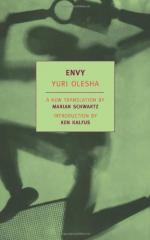|
This section contains 3,213 words (approx. 11 pages at 300 words per page) |

|
SOURCE: Harkins, William E. “No Day Without a Line: The World of Jurii Olesha.” In Russian Literature and American Critics, edited by Kenneth N. Brostrom, pp. 95-101. Ann Arbor: University of Michigan, 1984.
In the following essay, Harkins notes that Olesha's fragmentary reminiscences show both an esthetic view of life and an absence of a moral or political viewpoint.
Olesha's No Day Without a Line (Ni dnia bez strochki) was published posthumously in 1965. The book is far more than a series of fragmentary and casual autobiographical memoirs; it is a cycle of small essays that not only cover the life of its writer but provide information concerning his views, tastes, and philosophical and cultural likes and dislikes.1 The level of its individual, lapidary, and fragmented pieces is notably uneven, but then the book was conceived as an assemblage of fragments. When we consider that its execution comes from a...
|
This section contains 3,213 words (approx. 11 pages at 300 words per page) |

|


